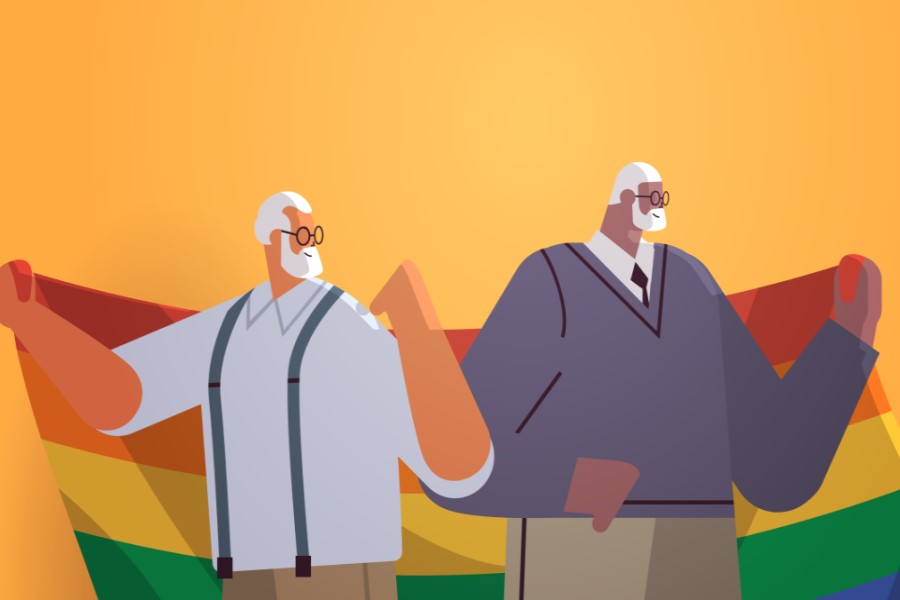
Lesbian, gay, bisexual, transgender and queer (LGBTQ) older adults face unique challenges in today’s healthcare ecosystem. Whether due to access issues, previous poor experiences and/or trauma related to healthcare providers or a system simply not set up to serve our aging population regardless of sexual orientation or gender identity, the barriers to care for LGBTQ older adults can feel overwhelming to patients, the patients’ loved ones and healthcare providers themselves.
Rajean Moone, PhD, LNHA, LALD, FGSA, with the College of Continuing & Professional Studies, the School of Public Health and the Minnesota Northstar Geriatrics Workforce Enhancement Program (GWEP), discusses how older adults, older adults’ loved ones and healthcare providers can work together to ensure LGBTQ older adults are receiving high quality care.
Q: What are health risks for LGBTQ older adults?
Moone: LGBTQ older adults are more likely to experience suicidal ideation, smoke and drink excessively, delay or not seek medical care, delay or not fill needed prescriptions, use emergency rooms, experience distress and develop some types of cancer. Additionally, LGBTQ older adults may face anxiety, social isolation or depression because of their experiences with homophobia or transphobia.
Q: Why are older LGBTQ people reluctant to seek healthcare?
Moone: Over a lifetime, negative experiences with healthcare — including traumatic events, microaggressions and overall stigma surrounding LGBTQ healthcare — can build up, and in response LGBTQ older adults may avoid healthcare services because of the fear of how providers will treat them. If you had experienced harassment, discrimination or abuse from someone, would you be inclined to return? Unfortunately, such occurrences often cause LGBTQ older adults to delay seeking help until catastrophic or irreversible damage has occurred.
Q: What is the LGBTQ Aging Paradox?
Moone: While many LGBTQ people rely on a family of choice — a group of people to whom they are not legally or biologically related but who they consider their family — LGBTQ older adults are less likely to have friends or family caregivers to rely on for care if needed. This social disparity, coupled with other risk factors, makes this group of older adults more likely to need support from formal care systems. This, then, is the LGBTQ Aging Paradox. Disparities result in needing more help from formal services, but a lifetime of experiences has created a fear of accessing those services among many LGBTQ older adults.
Q: How does cognitive impairment affect LGBTQ older adults?
Moone: Cognitive impairment occurs when troubles with learning, thinking or memory affect an individual’s everyday life. Conditions associated with cognitive impairment include various forms of dementia, such as Alzheimer’s disease, Lewy Body dementia, and symptoms related to some forms of Parkinson’s disease or HIV. People living with cognitive impairment may experience confusion about where they are or what time period they’re in. LGBTQ people are at higher risk for developing cognitive impairment, according to data from the Alzheimer’s Association.
Many LGBTQ older adults today remained silent or closeted about their identity through much of their past due to very real stigma and fear based on past experiences. For LGBTQ older adults living with cognitive impairment, these past experiences may result in increased uncertainty about their sexual orientation or gender identity’s public status, leading to anxiety, fear and self-imposed social isolation.
Q: What work are you doing to advance equitable healthcare for LGBTQ older adults?
Moone: It’s vital for health professionals to integrate LGBTQ-friendly practices into clinical care to mitigate disparities, which is at the core of the work that I do for GWEP. Whether it is reviewing organizational policies or conducting a needs assessment by surveying community members, my research focuses on understanding experiences of LGBTQ older adults and their families and then translating those experiences into tips and recommendations to promote LGBTQ-friendly care policies and practices. The outcome of much of my research has been incorporated into tips and resources which can be found in GWEP’s LGBTQ Aging Care Toolkit.
Rajean Moone, PhD, LNHA, LALD, FGSA, is the faculty director for Long Term Care Administration in the College of Continuing & Professional Studies and the associate director for education in the School of Public Health’s Center for Healthy Aging & Innovation. His work and research focuses on the experiences of LGBTQ older adults and how these experiences impact policies, services, and care. He is a member of the Governor’s Council on an Age-Friendly Minnesota, the MN Association of Geriatrics Inspired Clinicians Board and the FamilyMeans Board. He is a Fellow of the Gerontological Society of America, a lifetime member of the Minnesota Gerontological Society, a McNair Scholar and a Congressional/Health and Aging Policy Fellow. He also holds a Minnesota nursing home administrator’s license.
-30-
About “Talking...with UMN”
“Talking...with UMN” is a resource whereby University of Minnesota faculty answer questions on current and other topics of general interest. Feel free to republish this content. If you would like to schedule an interview with the faculty member or have topics you’d like the University of Minnesota to explore for future “Talking...with UMN,” please contact University Public Relations at [email protected].
About the Minnesota Northstar GWEP
The purpose of the Minnesota Northstar Geriatrics Workforce Enhancement Program is to improve the health and healthcare of older adults across Minnesota. It is supported by the Health Resources and Services Administration (HRSA) of the U.S. Department of Health and Human Services (HHS), the primary federal agency for improving health care for people who are geographically isolated and economically or medically vulnerable. The contents are those of the author(s) and do not necessarily represent the official views of, nor an endorsement, by HRSA, HHS or the U.S. Government. The Minnesota Northstar GWEP is also supported by the Otto Bremer Trust, the University of Minnesota Medical School and the Office of Academic Clinical Affairs.
- Categories:
- Health
- Equity and Diversity
- Medical




